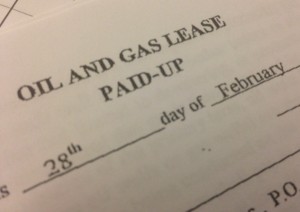Marcellus leases allow for impact fee deductions, despite law forbidding it
Pennsylvania’s oil and gas law prohibits companies from shifting the burden of paying impact fees to property owners who have leased their land for drilling.
According to the Pittsburgh Post-Gazette, some companies, including Chesapeake Energy and Chevron, have put language in their leases to allow for the deductions anyway.
In Chesapeake’s leases, the company “wanted landowners to agree that Pennsylvania impact fees would be deducted from their royalty payments in proportion to their interest. So if landowners agreed to a 15 percent royalty, they’d be responsible for 15 percent of the impact fee,” the newspaper reported today.
Act 13 spells out its intent bluntly.
“A producer may not make the fee … an obligation, indebtedness or liability of a landowner, leaseholder or other person in possession of real property, upon which the removal or extraction occurs,” the law states.
The legislation goes on to say that if such a provision is included in a lease, that part of the document “shall be null and void.” That’s true for leases signed before and after Act 13 took effect, the law states.
A Chesapeake Energy spokesman said the company declined to comment on the matter.
It won’t be clear if the companies are actually deducting impact fees on the leases that allow it until wells on the properties start producing gas and royalties. The Associated Press quotes a Chesapeake spokesman saying the company has not deducted impact fees from Pennsylvania royalties:
Chesapeake spokesman Gordon Pennoyer said the company hadn’t done so and believes it is in full compliance with state law.
A spokesman for the Marcellus Shale Coalition, an industry group, said Act 13’s prohibition on deducting impact fees from royalties supersedes any lease language that would allow for such deductions. Steve Townsend, an attorney quoted by the Post-Gazette, had a different reading of the law:
“[If] I’m a landowner, I’m allowed to negotiate whatever I want in my lease,” he said. “[Companies] bury it in the end of the piece. If the landowner agrees, it’s legal.”
Chesapeake’s practice of claiming expenses against royalties has raised complaints from landowners and resulted in a $7.5 million class action settlement in August.
Although state law sets the minimum royalty paid on gas production at 12.5 percent, a state Supreme Court decision in 2010 allowed companies to deduct the costs of moving the gas to market even if that means a landowner receives less than the minimum royalty.
State lawmakers have recently introduced bills to try to limit the amount companies can deduct for these post-production costs.
This post has been updated to include comments from the Marcellus Shale Coalition and reporting from the Associated Press.

















